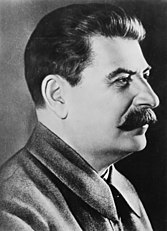
Back Totalitarisme Afrikaans Totalitarismus ALS ፍፁም ጠቅላይ Amharic الشمولية Arabic الانظمه الشموليه ARZ Totalitarismu AST Totalitarizm Azerbaijani توتالیتاریزیم AZB Таталітарызм Byelorussian Таталітарызм BE-X-OLD
Totalitarianism is a political system and a form of government that prohibits opposition political parties, disregards and outlaws the political claims of individual and group opposition to the state, and controls the public sphere and the private sphere of society. In the field of political science, totalitarianism is the extreme form of authoritarianism, wherein all socio-political power is held by a dictator, who also controls the national politics and the peoples of the nation with continual propaganda campaigns that are broadcast by state-controlled and by friendly private mass communications media.[1]
The totalitarian government uses ideology to control most aspects of human life, such as the political economy of the country, the system of education, the arts, the sciences, and the private-life morality of the citizens.[2] In the exercise of socio-political power, the difference between a totalitarian regime of government and an authoritarian regime of government is one of degree; whereas totalitarianism features a charismatic dictator and a fixed worldview, authoritarianism only features a dictator who holds power for the sake of holding power, and is supported, either jointly or individually, by a military junta and by the socio-economic elites who are the ruling class of the country.[3]
- ^ Conquest, Robert (1999). Reflections on a Ravaged Century. Norton. pp. 73–74. ISBN 0393048187.
- ^ Cite error: The named reference
regimewas invoked but never defined (see the help page). - ^ Cinpoes, Radu (2010). Nationalism and Identity in Romania: A History of Extreme Politics from the Birth of the State to EU Accession. London, Oxford, New York, New Delhi and Sydney: Bloomsbury. p. 70. ISBN 978-1848851665.

